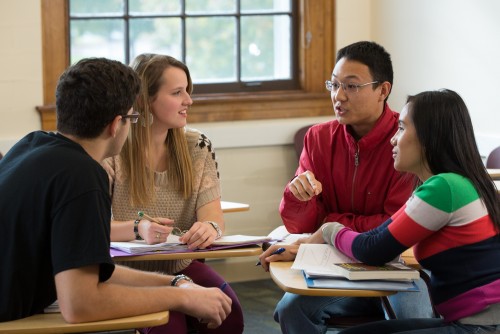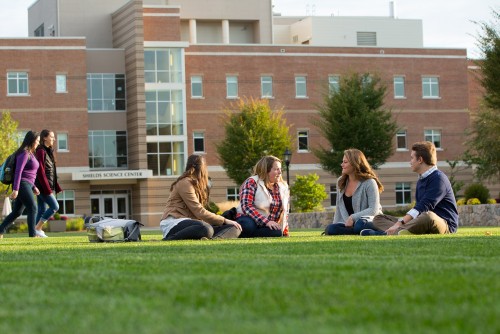Our Programs Allow You to Maximize Your Major’s Potential
At Stonehill, we help you find your passion and give you the tools to build the path that will maximize your impact after graduation.
Abe Medeiros ’21 knew his choice of a communication major was an excellent fit given his interests. But it wasn’t until he enrolled in Stonehill’s new Pathways to Careers program that he realized just how many doors the degree program could open and how much flexibility it provided.
“It was eye‑opening for me,” the Framingham, Massachusetts, native said. “I now know the skill sets I have can be used in many different ways. I realized I don’t need to put myself in a box.”
Success in college often is rooted in finding your passion and then building the path that allows you to maximize your impact after graduation.
Pathways to Careers is a personal development program designed to help students draw connections between their liberal arts curriculum and the skills needed to stand out in their chosen field. It is offered in partnership with Stonehill’s Career Development Center (CDC) and anchored by a one-credit course.
“There are so many opportunities available to students,” said Craig Kelley, associate provost of academic achievement. “What Stonehill does really well is assist students in figuring out which opportunities are best for them based on their interests and needs.”
A program rooted in national research on in-demand skills
The idea for Pathways to Careers stemmed from national research into the top skills in demand by employers. Pathways ensures that students develop an awareness of those in-demand skills during their time at Stonehill.
“It’s a self-directed skills development opportunity that includes the creation of a personal and professional growth plan,” said Christina Burney, director of the CDC and the instructor for the Pathways course. “It’s a pathway through our robust curriculum as well as our cocurricular activities; local, domestic and international internships; and study abroad programs. Each student creates an individualized path to achieve a desired goal.”
For the program’s launch, Kelley and Burney chose to offer the one-credit course to cohorts of sophomore students looking to explore and design career paths.
“This could be a good class for any student who’s thinking about where they might go with their career,” said Burney.
The course has two main goals:
- Learning to communicate to future employers the substantial value of the collaborative workplace skills gained through Stonehill’s liberal arts curriculum, presented through the Cornerstone Program, and
- Helping students choose a career path, and formulating a plan on how to acquire the hard, or technical, skills needed to succeed in that industry.
Desired soft skills ingrained in liberal arts curriculum at Stonehill
Stonehill’s Cornerstone Program develops the invaluable soft skills that employers and graduate schools desire in competitive applicants: course assignments enable students to hone their analytical and critical thinking skills; group projects foster leadership development; and in-class discussions prepare students to be effective communicators.
“Over their four years, we’re developing students in a holistic way. That’s the crux of the Congregation of Holy Cross education,” said Kelley.
Soft skill development has always been integral to Stonehill’s academic model. What Pathways does is teach students how to talk to employers about their command of those skills.
“The Pathways class made me sit back and think about everything that I have learned, understand what I gained from all my classes, and how it made me a better person,” said Madeleine Fancher ’21, a neuroscience major and art history minor from Clifton Park, New York.
The Pathways class made me sit back and think about everything that I have learned, understand what I gained from all my classes, and how it made me a better person
Intentional skill set arms students with unique attributes
Another aspect of this holistic approach is to begin exposing students to the hard skills that are in demand by employers, such as social media, data analysis, graphic design and sales.
“They’re broadening their horizons and thinking about other types of skills, interests, abilities and competencies desired in the workforce,” said Kelley. “They then think about how they can expand their own knowledge in those areas to make themselves more marketable.”
One way in which Burney encourages student reflection is by bringing in panels of Stonehill alumni to talk about the choices they have made since graduation. For Medeiros, a panel about technical skills inspired him to take a digital media production course and a graphic design course and to add a business minor.
“I realized that I had to build those skills before I go into the workforce,” he said. “It will set me up for success and help me live up to my fullest potential.”
Career management skills critical in an evolving marketplace
More than just equipping students with resume builders for life after graduation, the course encourages students to think deeply about their strengths and be intentional about learning new skills.
“This is a life skill,” said Burney. “We’re setting them up to manage their own careers by identifying where they are headed and how they will get there.”
Students say this has been an important takeaway in the program.
“It’s good to have a plan,” Medeiros said. “It’s good to aspire to go into a certain field. But if I don’t end up in a certain field, that’s OK.”
Students can reassess and transition to a new career because of the skills they acquire at the College. And the Pathways to Careers program reaffirms this.
“The job market is constantly evolving,” said Peter Ubertaccio, dean of the Thomas and Donna May School of Arts & Sciences, who is working with Burney and Kelley to grow the Pathways program. “A school of liberal arts prepares students for those points in their lives when they transition from one job to another or from one career to another. At Stonehill, our focus on ethical leadership, collaborative learning, inclusive pedagogy, team-building, project management, creativity and adaptability prepares students best for that marketplace.”
College plans to grow program to increase all graduates’ marketability
As the program gains traction, organizers are thinking of ways to expand its reach. Burney is petitioning for funding to begin the second phase — a spring course in which students choose a technical skill to study further.
“Skills like social media marketing or data analytics are incredibly valuable for landing an internship and ultimately a job in today’s market,” said Burney. “Taking an introductory course and adding those skills to your resume increases your marketability in many fields.”
She envisions a program in which a spring course would be followed by an internship over the summer. Regardless of how it evolves, students say it has already been instrumental in preparing them for the future.
“I am more open to new opportunities,” said Medeiros. “The Pathways to Careers course was perfect for me.”


